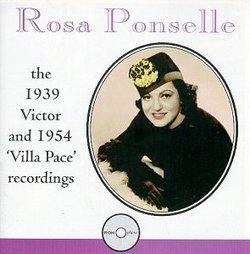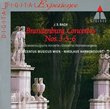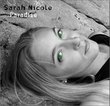| All Artists: Rosa Ponselle Title: 1939 Victor & 1954 Villa Pace Recordings Members Wishing: 1 Total Copies: 0 Label: Romophone Original Release Date: 1/1/1939 Re-Release Date: 11/8/1996 Album Type: Import Genres: Folk, Special Interest, Pop, Classical Styles: Vocal Pop, Opera & Classical Vocal Number of Discs: 3 SwapaCD Credits: 3 UPCs: 754238102226, 822165004620 |
Search - Rosa Ponselle :: 1939 Victor & 1954 Villa Pace Recordings
 | Rosa Ponselle 1939 Victor & 1954 Villa Pace Recordings Genres: Folk, Special Interest, Pop, Classical
Legendary soprano Rosa Ponselle recalled these sessions taped by RCA in her Baltimore home as the only time she enjoyed making records. Fourteen years after her abrupt retirement from opera, her voluptuous instrument (ruby... more » |
Larger Image |
CD DetailsSynopsis
Amazon.com Legendary soprano Rosa Ponselle recalled these sessions taped by RCA in her Baltimore home as the only time she enjoyed making records. Fourteen years after her abrupt retirement from opera, her voluptuous instrument (ruby red in the '39 Victors and now tinged with purple) soars to better advantage in the amplitude of her spacious music room than within the cramped confines of the recording studio. Whether in Beethoven, Schubert, Debussy, Mozart, or Tosti songs, or chestnuts like "Drink To Me Only With Thine Eyes," the vocalism is always informed by Ponselle's musical intelligence and sense of style. Romophone brings together all the material from these home sessions, including 75 minutes of music not issued by RCA, plus a promotional interview that reveals a warm, down-to-earth persona quite different from your typical diva stereotype. Ponselle fans need no encouragement to acquire this set. --Dan Davis Similar CDs
|
CD ReviewsRevealing BDSinC | Calgary, Alberta, Canada | 12/27/2004 (5 out of 5 stars) "It must be remembered when approaching these recordings that we are not hearing the Ponselle of the Met singing her great roles, we are hearing the Ponselle of retirement, and a long retirement. She seems to have left her career right at its height, and for whatever reasons. She was not idle, but was active in the world of opera in other ways (including working with many now famous singers when they were students: Sherryl Milnes, Beverly Sills just to name two). She approached her music with the vibrancy of her time, which is often at odds with how we would sing such things today (the Mozart aria for Cherubino for example). However, even though we hear a voice that has now started to show wear, not from oversinging, but rather from not being used all that often and from age, we are not listening to someone who has "lost it all." Everything that made her great is still there for us to enjoy and wish we could experience. Her range is no longer seamless as it was during her active singing career (a thing she was noted for), but her legato is a wonder to behold, as it was during her most active singing years. It is no wonder that singing teacher tell students to listen to her recordings to learn what legato is all about (and as a result, Ponselle is one of the most immitated singers in history, but at no time has anyone ever captured her sound, her quality, her depth of tone, her ring, her anything; people may try to immitate the essence of her singing by copying what they hear -- even the great Maria Callas' interpretations in La Vesta sound like haunting echos of Ponselle -- but what was the depth of her interpretations or of her voice no one has ever come close to matching). Her chest notes are raw at times, but they do not ruin the music in any way. Her top notes (which always put terror into her heart, but for the life of me, after listening to all her recordings available, I cannot figure out why -- even after reading her story of why the High C in Aida scared her so much --- her high notes were extremely secure, even a high D flat in the trovatore arias, no strain is evident at any time, not ever!), well, her top notes are at time frayed and not centered as they were. Still, once again, that is not a bother. It is evident that at times she has to "work rather noticeably" to produce her top notes, but there again, we are not offended by what we hear.
What we do experience, and mostly because we have no arias from her great roles to listen to, is the Ponselle way with a song. She just seemed to embrace a song and make it her own. Her interpretation may be enjoyable to you, you may find other singers you like better, but her interpretation is NEVER common and without validity. Each piece is truly her own stamped completely with her emotional and vocal understanding of the text and the music. That brings me to the diction part of the recording. Her RRRRRR (rolled R, or tongue trill by some) is very pronounced and now days may be seen as tasteless. However, it was the way things were sung then, and not just in Italian (even English actors rolled their R's beyond belief at that time). Personally, the well pronouced rolled R has never bothered me whatever, and in a way, I expect to hear it when singers are singing opera. It is so played down now days, one is sometimes completely unaware an R was even said. Ponselle's diction is incredible, and I don't just say that. Each and every word is completely understandable, even in English (which is crystle clear). It seems that was a common trait back in her day, for in many recordings of that time and earlier that I have the singers are exceptionally clear with their diction (even the Met manager, former singer, Edward Johnson is so clear while singing English -- a collection of Canadian songs -- one is stunned that the poor recordings quality didn't just eat up the words). Perhaps such singers as Renee Flemming and all the other greats of today should play some Ponselle recordings and learn what diction is all about. These recordings, though made long after her retirement, are still a great testiment as to what she was like as a singer, for they give us all the greatness that was hers. It makes people like me, who were born after she retired (though quite a while before she died, as I remember her well on live from the met broadcasts on the radio Saturday afternoons) wish we could go back in time and hear some real singing. In addition to the music, we have some interviews with Ruby Mercer, which are a real delight to listen to. No wonder people like Sills have nothing but great memories working with Ponselle. She is truly well grounded. She knows her contribution to the world of music for exactly what it is. There is no false modesty, nor is there any "high mindedness about self." We have a very down to earth person talking about things, even why she chose some of the music she did, in a very down to earth way. I recommend the set to anyone who loves to hear great singing, even if it would have more appeal to collectors than average people. It is well recorded, and the sound is excellent. It is a treasure to have on any record shelf." |

 Track Listings (24) - Disc #1
Track Listings (24) - Disc #1
